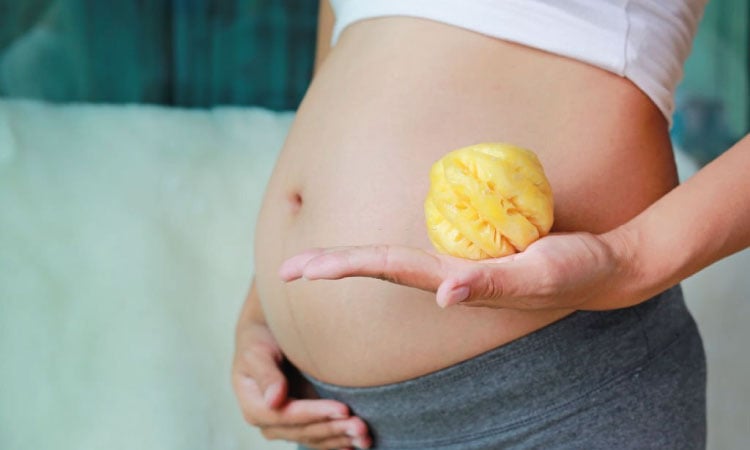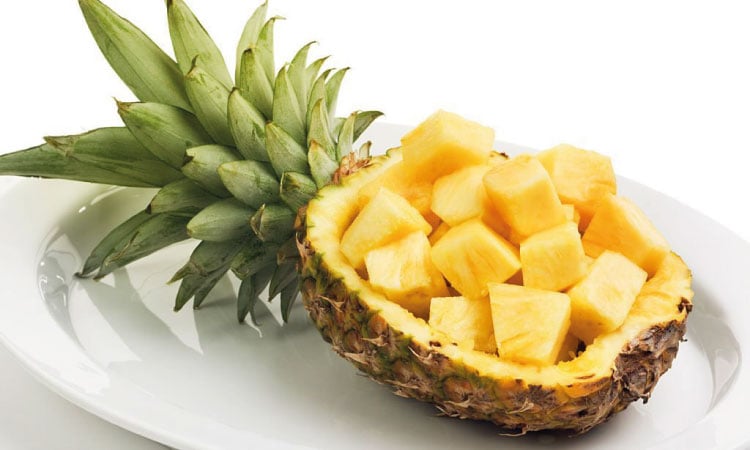It is no secret that pregnancy is an experience filled with joy and rewards. However, it also comes with some dos and don’ts. During pregnancy, pregnant women must adhere to a lot of dietary restrictions. One of the most controversial foods during pregnancy is pineapple. Pineapples aren’t just delicious; they’re loaded with nutrients. But several stubborn beliefs have been passed down through generations that persist when it comes to pineapple during pregnancy. Pineapples are among the so-called fruit associated with miscarriage and preterm labor. Let’s see if this is true.
What Is Pineapple?
Healthy and delicious, pineapple is one of the world’s most popular tropical fruits. It is a great source of nutrients, antioxidants, and other helpful compounds, including enzymes that protect against inflammatory diseases. The fruit has a sweet and tart taste. It is a very versatile fruit. You can find it in savory dishes, desserts, salads, and beverages. You can eat it freshly cut, baked, or grilled.
Nutritional Profile Of Pineapple
The nutritional profile of pineapple is impressive despite its low-calorie content. According to a source, one cup (165 grams) of sliced pineapple contains the following nutrients.
- Calories: 83
- Fat: 1.7 grams
- Protein: 1 gram
- Carbs: 21.6 grams
- Fiber: 2.3 grams
It also provides
- 88% of the DV (Daily Value) Vitamin C
- 109% of the DV Manganese
- 20% of the DV Copper
- 11% of the DV Vitamin B6
- 11% of the DV Thiamine
- 7% of the DV Folate
Pineapples also contain trace amounts of iron, phosphorus, zinc, magnesium, calcium, and vitamins A and K.
Related Reading: 11 Healthy And Refreshing Juices During Pregnancy To Drink
Is It Safe To Have Pineapple During Pregnancy?
In a nutshell, yes. It’s perfectly safe to consume pineapple throughout all stages of pregnancy. In fact, pineapple is a great source of multiple nutrients that are vital for a healthy pregnancy.
So, what’s the controversy all about?
Calculate Due Date With LMP
The controversy about pineapple during pregnancy is because it contains an enzyme called bromelain. Bromelain is believed to be dangerous for pregnant women due to its ability to trigger premature contractions. Consequently, it could cause early labor or even miscarriage, thus pineapple is on the list of foods that might cause miscarriage.
Bromelain as a dietary supplement can have adverse effects during pregnancy, but pineapple flesh has insufficient bromelain to produce the same effects.
A pregnant woman would have to eat a lot of pineapples to reach a level of bromelain that would affect her and her developing fetus.
As a rule, we eat only the outer flesh of a pineapple, which has very little bromelain and will not adversely affect pregnancy. This enzyme is particularly prevalent in the fruit’s core, which is not usually eaten.
Benefits Of Eating Pineapple During Pregnancy

Moderate consumption of pineapples during pregnancy can boost nutrient intake to a great degree. Below we list some of the health benefits of pineapples during pregnancy.
1. Boost immunity
Pineapples are packed with vitamin C. Pineapple boosts immunity during pregnancy and repairs and prevents cell damage. As well, vitamin C helps produce collagen a protein that contributes to the development of connective tissue. Thus, eating pineapple during pregnancy can also contribute to the development of the baby’s skin, bones, tendons, and cartilage1.
2. Cures colds and coughs
Tropical pineapple juice is a rich source of bioactive compounds and mineral micronutrients. Pineapples are good for those who have a cold. This is because pineapples contain bromelain. Bromelain has anti-inflammatory properties. Therefore, it helps in fighting colds and coughs. Often, pineapple juice is used as a home remedy for coughing2.
Related Reading: 11 Indian Home Remedies For Cold During Pregnancy
3. Enhances bone strength
Pineapples contain manganese, which strengthens bones3. Women often compromise their bone density during pregnancy. Consequently, they are prone to osteoporosis in the future. To prevent this, you only need to include pineapple in your diet. Pineapples contain manganese, a mineral that is important to bone health. Although in trace amounts, pineapple contains zinc, copper, and calcium, components that contribute to bone strength. This is why pineapple can enhance bone strength.
4. Strengthen the nervous system and combats constipation
Thiamine, found in pineapples, regulates the function of the heart and nervous system. For a healthy pregnancy, a healthy cardiovascular system and a strong nervous system are important. Pineapple is a good source of fiber as well, thus an easy home remedy to relieve constipation, a common complaint among pregnant women.
5. Enhances the production of RBCs
A diet rich in vitamin B6 can prevent anemia by promoting red blood cell production. This can also relieve morning sickness by producing antibodies. Pineapples are rich in vitamin B64. Copper, which is necessary for the production of red blood cells, is present in a pineapple in small but noticeable amounts. In addition to aiding the production of red blood cells, copper in pineapples is also necessary for a baby’s heart’s development.
6. Prevents hypertension
During pregnancy, it is important to maintain healthy blood pressure. High blood pressure during pregnancy can lead to a variety of problems. When you have hypertension, eat pineapple frequently since this fruit is high in potassium and low sodium and thus, can assist in lowering blood pressure.
7. Helps to prevent birth defects and anemia
During pregnancy, iron and folic acid supplements are highly recommended as they can prevent birth defects as well as prevent anemia. Pineapples have an adequate amount of iron and folic acid.
8. Helps to prevent joint pain
It is common for pregnant women to experience severe joint pain during pregnancy. The main cause of joint pain is inflammation. Bromelain, a compound found in pineapple, has anti-inflammatory properties. Drinking a glass of pineapple juice or adding slices of pineapple to your food helps to relieve joint pain much more effectively.
9. Helps you stay hydrated
It is very important to stay hydrated during pregnancy. Among the complications associated with dehydration is preterm labor. Pineapples have an 87% water content.
10. Act as a natural energizer
It is not uncommon for pregnant women to feel fatigued. Along with manganese and thiamin, which contribute to a body’s energy production, pineapple contains vitamin B6 which helps stabilize blood sugar levels. Eating pineapple slices or a glass of pineapple juice can elevate energy levels when you feel tired and sluggish.
Related Reading: Jackfruit During Pregnancy- Benefits, Precautions, And Risks
Risks And Precautions
In fact, a glass of pineapple juice can help you overcome fatigue and boost your stamina. You’ll also get plenty of vitamins and nutrients from pineapple if you consume it moderately. Be sure not to overindulge so you don’t end up with too much acid and sugar in your system. There are many risks involved here, and precautionary measures are necessary.
Risks
Pineapple consumption during pregnancy has the following risks:
- Heartburn: Though pineapple can be beneficial and safe to consume in a limited amount during pregnancy, it does contain a lot of acids that can lead to heartburn. Pregnancy can bring on heartburn and acid reflux, which means too much acid is not good. Because of this, you might want to avoid eating too many pineapple slices when pregnant
- High in sugar: Like other fruits, pineapples are packed with sugar – which accounts for their delicious sweetness. Pregnant women who are overweight shouldn’t eat pineapples due to their high-calorie content. Eating too much pineapple could quickly fill you with sugar that you don’t really need. That’s another reason why it is sensible to limit your pineapple consumption during pregnancy
- Risk of an allergic reaction: Pineapples can also cause allergic reactions in some people. As a general rule, if you are allergic to latex, pollen, or other fruits, you are at risk of being allergic to pineapple too. You might want to proceed with caution before diving into that pineapple if you have these allergies. Pregnant women are more likely to develop spontaneous allergic reactions. Symptoms of pineapple allergy include itching, swelling, and skin rash. It can also cause runny noses or congestion. It may make asthma symptoms worse
- Tooth Damage: Too much pineapple can cause teeth desensitization or cause tooth decay. Fruits like pineapple, which have a high acidic content, can trigger a chemical reaction in the mouth. With improper oral hygiene practices and excessive pineapple intake, tooth decay may be an issue
- Cause Diarrhea: Bromelain, a compound in pineapple, causes diarrhea if consumed in large quantities
- Cause discomfort in the mouth: People who consume pineapple juice may experience tenderness in the mouth, lips, or tongue. A component of pineapple called bromelain is to blame for this
Precautions
When consuming pineapple during pregnancy, the following precautions must be taken:
- Pineapples contain a large amount of sugar, which is a major source of calories. So, eating it in moderation is best
- Consult your doctor before including pineapple in your diet if you have gestational diabetes
- Don’t take Bromelain with blood thinners, since it has anticoagulant properties. Taking it with blood thinners may increase the risk of bleeding
- Pineapple cores contain most of the bromelain, so you shouldn’t consume them
- Only drink pineapple juice made from ripened pineapples. Unripened pineapples contain toxins that can cause diarrhea and vomiting
- In order to get more roughage and fiber, as in preventing constipation, take pineapple whole rather than pineapple juice
- Despite its tough appearance, pineapple bruises easily. Do not store uncut pineapple over two days at room temperature
When Is It Not A Good Idea To Eat Pineapple During Pregnancy?

- Avoid fresh pineapple if you suffer from ulcers or heartburn. Instead, eat canned pineapple in moderation
- When you have pancreatitis, gestational diabetes, or type 1 or type 2 diabetes, you should avoid pineapple as it might be too high in sugar for you
- Pineapple may also be a bad choice if you are overweight, due to its high-calorie content
- Those who suffer from low blood pressure, anemia, or hemophilia should avoid pineapple during pregnancy because bromelain thins the blood
Related Reading: 15 Fruits Not To Eat During Pregnancy
Can Pineapples Induce Miscarriage?
Bromelain can soften the cervix, leading to a miscarriage or premature labor when accumulated in the body. In order for bromelain levels to rise dangerously, an expecting mother must consume a large number of pineapples.
However, it is always wise to stay away from anything that has a remote chance to trigger uterine contractions in the first trimester of pregnancy. Therefore, it is not advisable to consume pineapple during the first trimester of pregnancy.
Pineapple During Pregnancy – How Much Is Not Too Much?
A serving of pineapple, which is a cupful, contains far less bromelain than is needed to start labor. However, it is recommended to avoid pineapples in the first trimester. The second trimester is the time when you can eat around 50 to 100 gms of pineapple per week. You can consume up to 250 grams of pineapple per day during your third trimester. Consult your gynecologist if you are concerned about the quantity and aftereffects of pineapple consumption.
How To Be Safe When Eating Pineapples During Pregnancy?
- Before cutting pineapple, rinse it thoroughly. It’s important to thoroughly clean the shell before you use it, as your knife will touch both the shell and the flesh when it’s used
- A 30-minute soaking in saltwater is advised prior to eat fresh pineapple. Bio-glycosides, as well as bromelain, can be washed away by saltwater
- Freshly cut pineapple should be eaten as soon as possible
Conclusion

According to Our Nutritionist, Sushree, while the overall risk is low, some individuals might be more sensitive, especially those with a history of pregnancy complications. Enjoying pineapple in moderation is generally safe. By promoting evidence- based information and personalized care, we can empower pregnant women to make informed choices about their diet and enjoy a healthy pregnancy.
Pay attention to how you feel after consuming and discuss any concerns with your doctor. A healthcare provider can provide further guidance if you have any questions about eating pineapple during pregnancy or concerns about miscarriage risk. Please remember that every pregnancy is different. A similar fruit can have adverse effects.
FAQs
When consumed moderately, pineapple is not harmful to developing fetuses. It contains vitamins that are essential to the growth and development of the fetus.
This is not a good idea since it can make you feel very uncomfortable, especially if you are not in the habit of eating pineapples every morning.
If you consume it on an empty stomach, it can cause acidity. Ensure that you consume some fresh pineapple juice/pineapple after you have completed your breakfast.
Melatonin is found in pineapples in significant amounts. Melatonin markers in the body can increase dramatically after eating pineapple.
You could fall asleep faster and stay asleep longer if you consume this sweet treat regularly before bed.


